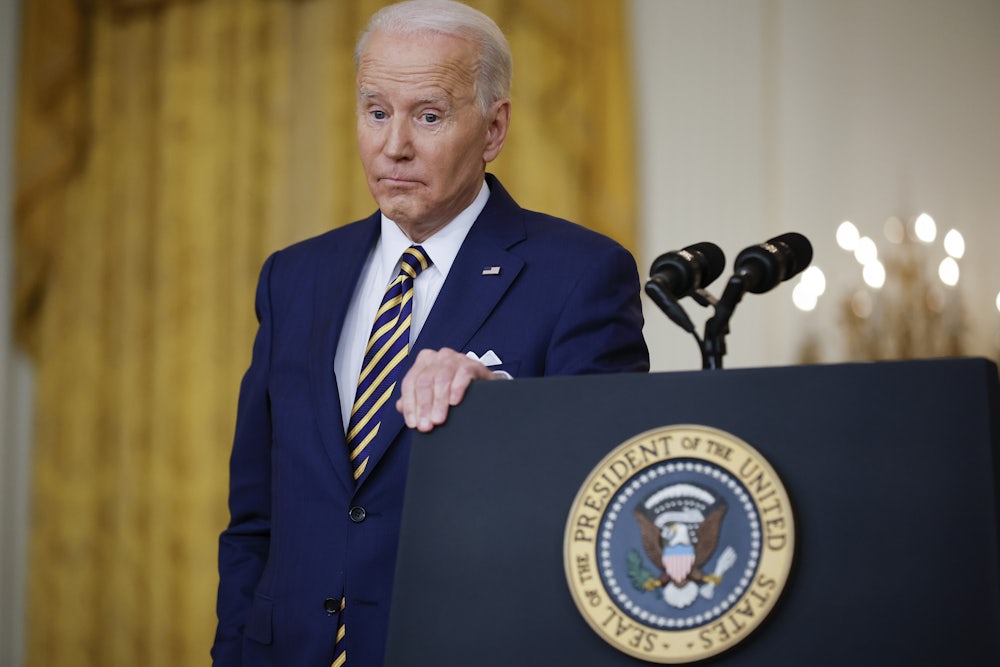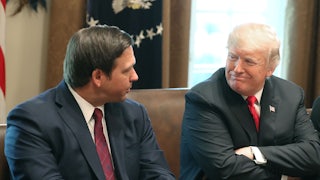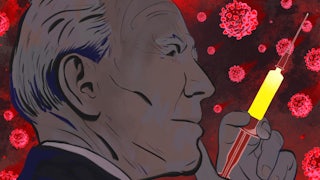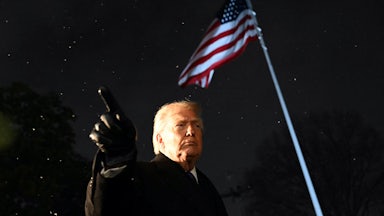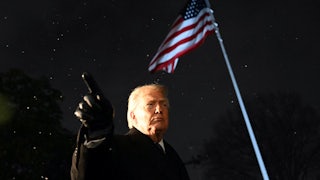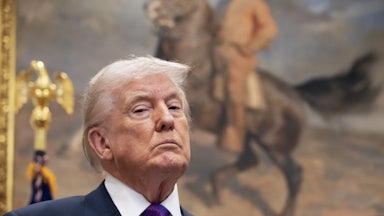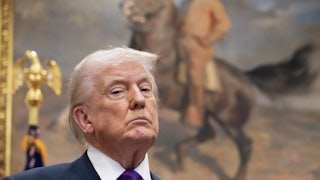For a year, the White House communications staff has shrouded Joe Biden in bubble wrap—apparently fearful that, if left to his own devices, the 79-year-old president would prove too garrulous and too off-message. Not only has Biden held far fewer first-year press conferences than any predecessor since Ronald Reagan, but the president’s handlers also shielded him from almost all interviews with knowledgeable print reporters.
But on his 364th day in office, we got 112 minutes of pure, unplugged Joe Biden, filled with shrewd observations, occasional regrets, apologies for “talking too much,” and more candor than is normal from a sitting president. Yes, there were moments during Wednesday’s press conference that probably made his aides backstage wince, especially on the volatile issue of Ukraine. But Biden also displayed a mastery of the realities of power and previewed probably what will be the Democrats’ strongest argument in November.
The initial post-presser headlines zeroed in on Biden’s comments on Ukraine, which some pundits may consign to the dread category of “gaffes.” Reflecting the foreign policy consensus about Vladimir Putin’s intentions, Biden said, “My guess is he will move in. He has to do something.” That assessment almost certainly was more honest than whatever vague language was suggested in the president’s briefing books.
Biden also undoubtedly caused consternation among his national security staff when he seemed to put a “minor incursion” by Russia into Ukraine in a different and lesser category than a full-scale invasion. But Biden seemingly backtracked later in the press conference when he suggested that by “minor incursion” he meant things like cyberattacks. And just to be on the safe side, Jen Psaki, the White House press secretary, immediately issued a statement saying, “If any Russian military forces move across the Ukrainian border, that’s a renewed invasion.”
The hand-wringing over Biden’s imprecise language on Ukraine harks back to the controversy surrounding the very first live, televised presidential press conference. Sixty-one years ago, as John Kennedy faced reporters and made TV history, he was asked about “apprehension about the instantaneous broadcast of presidential press conferences” because “an inadvertent statement [would be] no longer correctable.” JFK rightly waved off these concerns, stressing that the possible need for clarification was more than outweighed by “the advantage of providing more direct communication.”
Nothing Putin does in Ukraine is apt to be swayed by anything Biden said Wednesday, even his warning that “if they invade, they’re going to pay.” As Biden put it in reflecting the mercurial nature of the Russian president, “I suspect it matters which side of the bed he gets up on in the morning as to exactly what he’s going to do.”
A defensive tone creeps into every Biden comment on the abject withdrawal from Afghanistan, including his words Wednesday, “I make no apologies for what I did.” But when it comes to Ukraine, Biden’s foreign policy experience, for the most part, inspires confidence. Referring, for example, to his recent conversation with Sauli Niinistö, the president of Finland, and invoking Sweden as well, Biden smartly warned that these Nordic nations might rethink their traditional neutrality if Putin became too aggressive in menacing his neighbors.
If Ukraine was the dominant news story Wednesday, Biden’s comments on the Republicans and 2022 offer larger political implications. Again and again, the president returned to a theme that we will hear in the fall campaign: “What are the Republicans for? What are they for? Name me one thing they’re for.” In his opening remarks, a well-briefed Biden quoted from Chris Sununu, New Hampshire’s popular Republican governor, who recently explained to the Washington Examiner why he had passed up a potentially winnable Senate race. After talking with some Senate Republicans, Sununu concluded, “They were all, for the most part, content with the speed at which they weren’t doing anything. It was very clear that we just have to hold the line for two years. OK, so I’m just going to be a roadblock for the next two years? That’s not what I do.”
In another effective line, Biden asked rhetorically, “Did you ever think that one man out of office could intimidate an entire party where they’re unwilling to take any vote contrary to what he thinks should be taken, for fear of being defeated in the primary?” Then Biden referred to five unnamed GOP senators who told him that they lived in mortal terror of right-wing challenges from Trump true believers.
It is easy to glibly liken Biden’s current political plight to that of Barack Obama in the 2010 midterms, when the Democrats lost a stunning 63 House seats and six Senate seats. But as someone who covered that Democratic debacle, I know that Obama was only grudgingly invested in the congressional races, and his campaign appearances radiated all the joy of dental surgery.
Biden, in sharp contrast, pledged Wednesday, “I’m going to be deeply involved in these off-year elections.… We’re going to be out there making sure we’re helping all the candidates.” Obviously, Biden is not exactly up there with Obama as a star political attraction. But an enthusiastic president with a message (“What are the Republicans for?”) beats a charismatic figure like Obama barely going through the motions.
In an intriguing comment, Biden expressed frustration about being confined to the White House because of Covid-19 and the burden of presidential business. He talked about traveling more, almost as much to get a sense of the nation as to stump for his policies. It reminded me of Bill Clinton in his first term wanting to see tapes of focus groups so he could get a better sense of the voters, now that he was constrained from meeting strangers by the presidential bubble.
There is a rhythm to presidential news conferences that transcends the individual in the White House. Rereading the transcript of Kennedy’s first news conference, I was stunned by the continuities with today. Nearly half the questions posed to JFK involved relations with Russia, which then, like now, was in a hair-trigger place. In another deja-vu-all-over-again moment, Kennedy’s longest response was about congressional obstruction of his legislative agenda. Back in 1961, it was the Southern-dominated House Rules Committee where all liberal legislation went to die. Kennedy even got a question on voting rights, and the president responded forcefully, “Congress … enacted legislation which placed very clear responsibility on the executive branch to protect the right of voting.… This administration will pursue the problem of providing that protection with all vigor.”
Part of the mythology surrounding JFK was his comfortable mastery of the press conference format. Biden, who came of age politically in the shadow of the Kennedys, should take pride in how well he handled the biggest press conference of his presidency. But the key test will be whether Biden’s skittish press team allows him to do it again—and soon.
